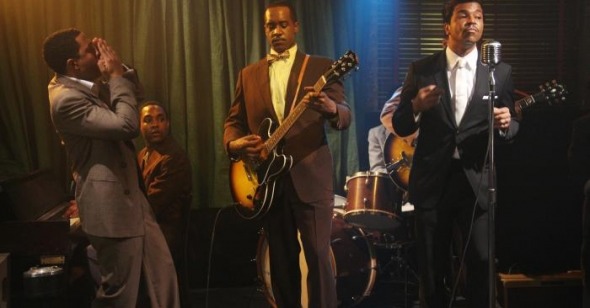Blue(s) Movie
by Nick Pinkerton
Cadillac Records
Dir. Darnell Martin, U.S., TriStar Pictures
When Syd Nathan, the CEO of King Records, died in 1968, James Brown, the labelâs greatest star, bought the desk from Nathanâs office and had it fitted with a gold plaque reading âI Remember the Man Syd Nathan.â Nathan was white, and Brown boastfully blackâso how to account for this? If we were to believe the moviesâ official history of rock music, we canât; the narrative is one of the grudging black artistâs innovation, white ownerâs exploitation, and cracker shysterâs appropriationâthe attitude summarized in Mos Defâs insipid, ahistorical song âRock ânâ Roll.â
Def shows up in Cadillac Records as an insouciant Chuck Berry. Enlightened liberals in the audience will enjoy their chance to applaud their preconceptions when Def/Berry catches out the Beach Boysâ plagiarizing and plays martyr to bigotry during his Mann Act arrest, but screenwriter/director Darnell Martinâs democratic treatment places Berryâs voice as just one among a multitude. In fact, when Berry first arrives in Chicago, heâs playing country guitar twangâMartinâs subtle scoff at the myth of âstolenâ music. (Besides, as everyone knows, Berry actually lifted his style from a time-traveling Alex P. Keaton.)
Martinâs fictionalization of the rise and fall of Chicagoâs Chess Records (1950-68) uses the declamatory blues song âIâm a Manâ as its theme, and follows several men attempting to assert that fact through womanizing, moving 45s, and packing .45s: immigrant label founder Leonard Chess (b. Czyz, in Poland; played by Adrien Brody); his first star, Muddy Waters (Jeffrey Wright); Watersâs protege, Little Walter (Columbus Short). The aspiration and feeling at times ring as pure as Midnight Ramble melodrama, everyone trying to get through their own way, with contempt for the restâWaters in a day-by-day blue-collar trudge, Walter through pure anarchy and, with imperious independence, Howlinâ Wolf (Eamonn Walker, in a furnace-hot performance).
Itâs a scattered movie, alloyed by uniformly high performances and extravagant emotion. Considering its aspirations to historical scope, the timeline is radically reshuffled (Elvis leaving for the army after the Rolling Stones hit Chicago?); key characters (Chessâs brother Phil) are missing, as well as musical elementsââhillbillyâ is only alluded to, jump blues not at all; the Southern church is entirely absent (this is a felt lack, as you canât rightly make devilâs music with no God).
Rock obscurantists can be worse sticklers than sci-fi fanboys, but it must be said that Cadillac Records doesnât condescend to history even when jumbling factsâscenes are largely treated as interactions between feasible humans, not as excuses to broadcast racial parable. Respect is paid to the complex cultural pluralities behind the music.
Here, the blues, at one point, is described as âa whole lot of fuckinââ, and thatâs what we see: Chess fuckinâ his roster with improvisatory bookkeeping and unconscious paternalism; the artists fuckinâ themselves (and Chess) with profligacy and belligerent living; and actual fuckinâ, as the filmâs later chapters are dedicated much to the affair (historically unsubstantiated) between Chess and his top 1960s signee Etta James (Beyonce Knowles). The story goes that Chess had to leave the studio to hide his tears when he first heard James sing âIâd Rather Go BlindââBrodyâs expressive devastation and the luxurious masochism in Knowlesâs voice entwine here to the highest in the filmâs Himalayan emotional peaks.
The child of all that fuckinâ was electric rock ânâ roll music, sharing the genes of declassĂ© Eastern European Jews who emigrated to the Brill Building from piss-poor shtetls, Scotch-Irish rednecks from the rawest backwood hollers, and sharecroppers and their sons from Mississippi Delta shacks. It was the 20th centuryâs truest music, and Cadillac Records doesnât disgrace it.
